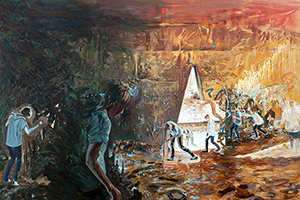 Dot Vermeulen, Anthropology (2014),
Oil on plywood, 300 x 200cm.
Photo: Supplied |
“I am primarily fascinated in the travelling or movement of images in different spaces and media. By moving images from one medium into another, or posting and reposting them in different urban and virtual spaces, I ask questions about media presence and space.”
According to the late artist
Dot Vermeulen, this is what the work for her Master’s degree was about. She was still completing it at the
Department of Fine Arts at the University of the Free State (UFS).
Her work, called
Posting Presence, is currently on display at the
Johannes Stegmann Art Gallery on the Bloemfontein Campus. The exhibition is running from 1-30 October 2015.
Vermeulen was a junior lecturer at the
Department of Fine Arts before she passed away in a
car accident in April 2015.
According to
Angela de Jesus, curator of the UFS Art Galery, the exhibition would have been part of Vermeulen’s final evaluation for her Master’s degree. She was one of South Africa’s most promising young artists, and won the prestigious
Sasol New Signatures art competition in 2013.
In the work she had done in Posting Presence, Vermeulen said the spaces represented were derived from areas under bridges in an urban space where the visual messages left, speak of an accumulation of movement.
Exhibition eventAn exhibition event was held on Friday 16 October 2015 at the Johannes Stegmann Art Gallery to celebrate Vermeulen’s work.
Janine Allen-Spies and
Prof Suzanne Human, the supervisors of her Master’s degree,spoke about the work to those attending.
CatalogueDe Jesus said a catalogue of Vermeulen’s research for Posting Presence had also been compiled, and would be available at the
UFS Sasol Library in order for others to “use her work for further research”.
• Vermeulen’s work can be seen from 08:30-16:30 daily until 30 October at the Johannes Stegmann Art Gallery on the Bloemfontein Campus.